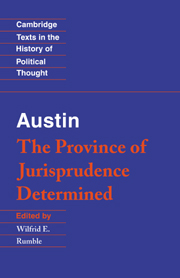Book contents
- Frontmatter
- Contents
- Acknowledgements
- Introduction
- Note on the text
- Chronology of John Austin's life
- Selected bibliography
- Biographical notes
- The Province of Jurisprudence Determined
- Abstract of Lectures
- Analysis of Lectures
- Lecture I.
- Lecture II.
- Lecture III.
- Lecture IV.
- Lecture V.
- Lecture VI.
- Index
- Cambridge Texts in the History of Political Thought
Lecture IV.
Published online by Cambridge University Press: 02 December 2009
- Frontmatter
- Contents
- Acknowledgements
- Introduction
- Note on the text
- Chronology of John Austin's life
- Selected bibliography
- Biographical notes
- The Province of Jurisprudence Determined
- Abstract of Lectures
- Analysis of Lectures
- Lecture I.
- Lecture II.
- Lecture III.
- Lecture IV.
- Lecture V.
- Lecture VI.
- Index
- Cambridge Texts in the History of Political Thought
Summary
in my last lecture, I endeavoured to answer an objection which may be urged against the theory of utility. And to the purpose of linking my present with my last lecture, I will now restate, in a somewhat abridged shape, that summary of the objection and the answer with which I concluded my discourse.
The objection may be put briefly, in the following manner.
If utility be the proximate test of positive law and morality, it is impossible that the rules of conduct actually obtaining amongst mankind should accord completely and correctly with the laws established by the Deity. The index to his will is imperfect and uncertain. His laws are signified obscurely to those upon whom they are binding, and are subject to inevitable and involuntary misconstruction.
For, first, positive law and morality, fashioned on the principle of utility, are gotten by observation and induction from the tendencies of human actions. Consequently, till these actions shall be marked and classed with perfect completeness, and their effects observed and ascertained with similar completeness, positive law and morality, fashioned on the principle of utility, must be more or less defective, and more or less erroneous. And, these actions being infinitely various, and their effects being infinitely diversified, the work of classing them completely and of collecting their effects completely, transcends the limited faculties of created and finite beings.
- Type
- Chapter
- Information
- Austin: The Province of Jurisprudence Determined , pp. 77 - 105Publisher: Cambridge University PressPrint publication year: 1995

